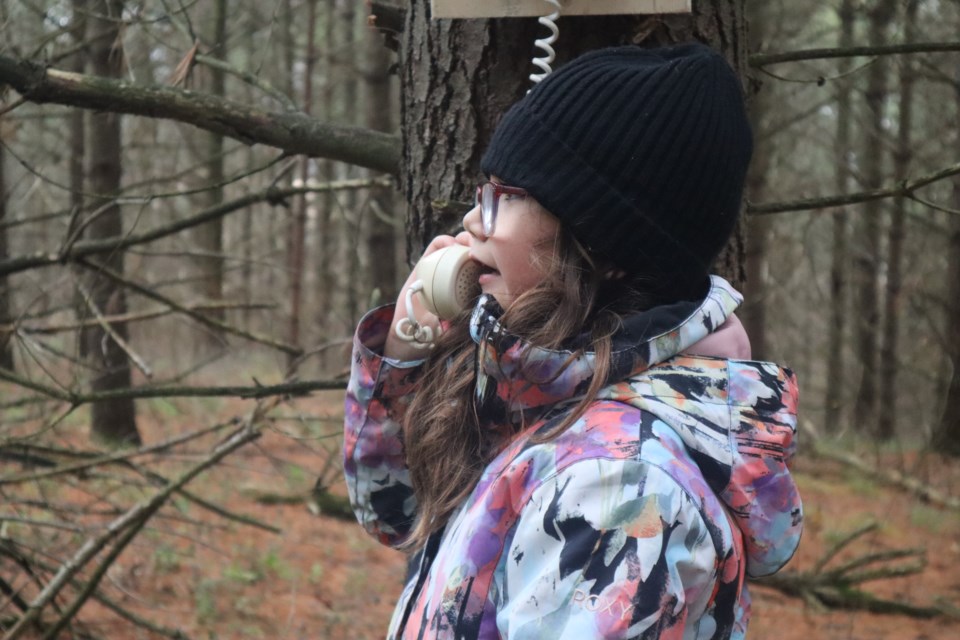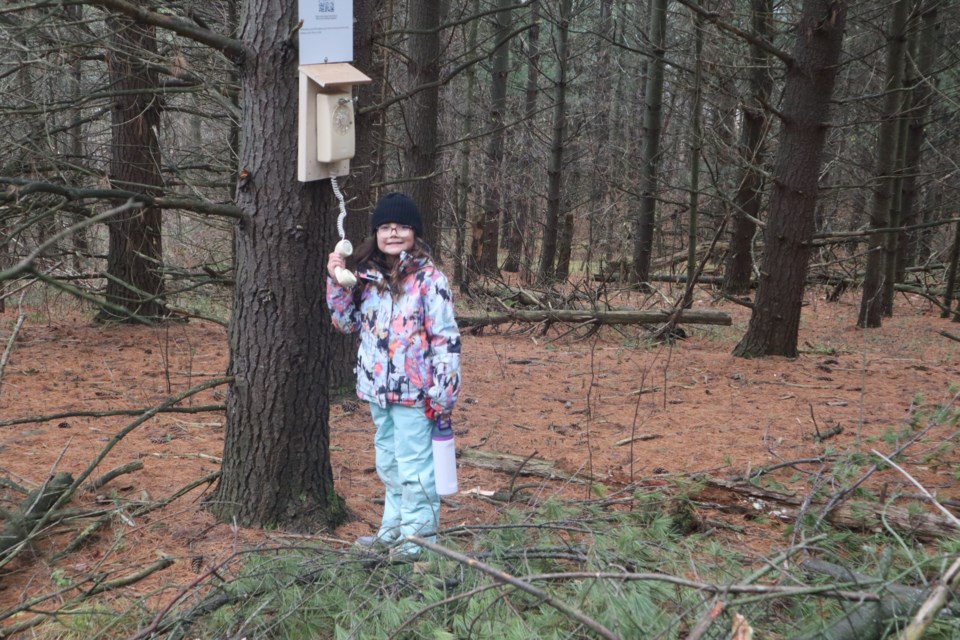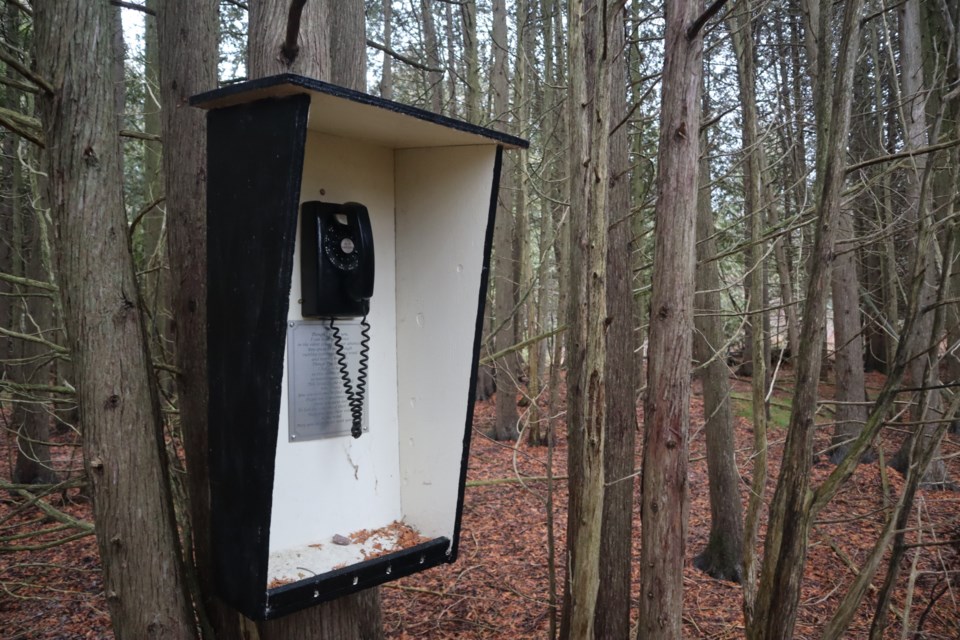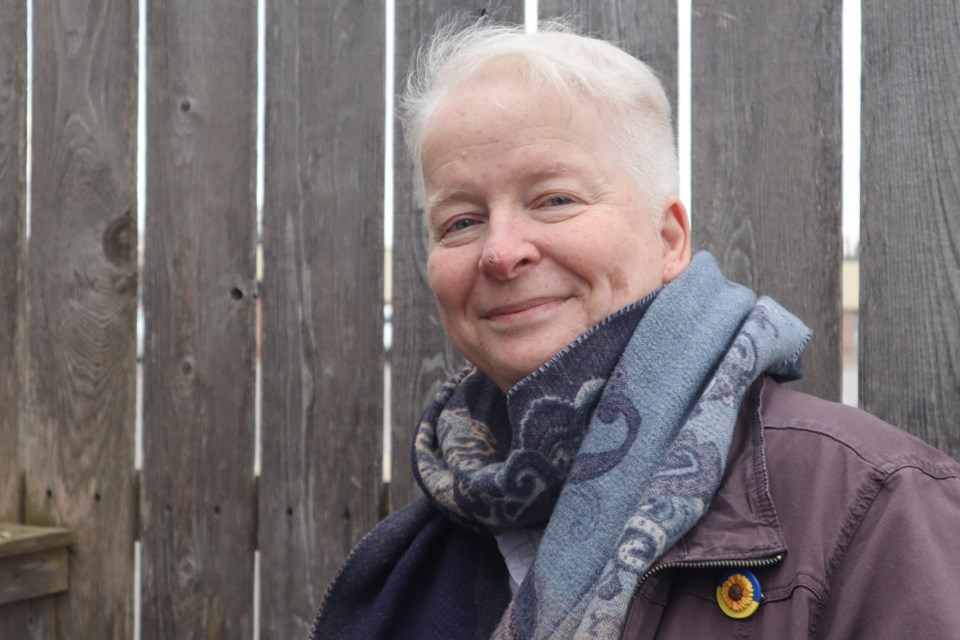Monica Chow-Briggs never got to meet her grandmother, who died before she was born. But thanks to a growing trend in grief relief, she recently had a chance to speak to her.
A wind phone made that possible.
In the woods in Starkey Hill Conservation Area, just outside Guelph, if you follow the path and veer to the right, you will come across a wind phone. It’s nestled in the forest on a tree and its wires aren’t connected to anything.
The intention is for you to pick up the phone and speak to a loved one who died.

Nine-year-old Monica ran to her mom to get the number of her grandmother.
She dialed the number on the rotary phone but needed some help. She spoke to her grandmother with no response on the other end.
Tears streamed down Lynda's face after her daughter hung up the phone.
“It's been a long time since I've thought about it,” said Lynda, whose mom died when she was 15 from lung cancer.
Lynda's daughter has always felt close to her grandmother.
“I mean I'd say that if you feel like you want to connect, this is a really tangible way to do it,” she said. “To just be able to come out into a quiet, lovely place and reflect. To talk to those that you'd like to.”
This concept called kaze no denwa, the phone of wind in Japanese, was created by Itaru Sasaki who lives in Kujira-Yama near Otsuchi, Japan.
He created it after a loved one died but it took on greater meaning after a tsunami hit Japan in 2011 that killed thousands.
The phone “is connected to nowhere, however talking to lost loved ones via the phone makes people feeling to be connected with their lost loved ones, and their thought will surely be delivered to their loved ones,” said on the Bell Gardia Kujirayama wesbite, the garden where the phone is located.
Sasaki and his wife take care of the phone in the garden.
Kujira-Yama and Puslinch aren’t the only places with wind phones; the concept is global. A website called My Wind Phone has a map of wind phones and encourages people to submit photos and information for the wind phones they find.
Amy Dawson is the founder of My Wind Phone and she is based in the U.S. She lost her daughter, Emily, on Apr. 5, 2020 to a terminal illness.
After she died, Dawson became a grief coach.
The wind phone she uses regularly is on the Princeton campus.
She’s mapped over 180 wind phones. Part of why she thinks there have been so many phones popping up is because of COVID.
“And we didn't get to say goodbye to our people, often at the emergency rooms and we had to walk away,” said Dawson.
Using a wind phone doesn’t have to be because you lost a loved one. It can be for any type of loss; loss of a job or a relationship, Dawson said.
The wind phones bring awareness about grief.
“Wind phones aren't for everyone, but for the people that they're for they're profoundly healing. And they really do help people process their grief. It's very important. I think if we can help people realize that if we could change our perspective on that it's a physical loss. But their spirit is still with you, and that you're not alone,” said Dawson.
Someone had contacted her about putting a wind phone at Starkey Hill and it's been up for a couple weeks.
There are private wind phones too.
After Keith Lamont’s wife Mary died in June 2021 he constructed a wind phone to put up on his property in Erin. They were high school sweethearts and best friends when they got together at 15.
Mary was kind, quiet, reserved, intelligent and fun “until she wasn’t,” Lamont said.
She was diagnosed with early onset frontotemporal dementia in 2009. Lamont was her caregiver for a long time. “You just waste away and your body stops functioning,” he said.
The wind phone isn’t for him since he’s already gone through his journey of grief. It’s for everyone else.
“But I could see me coming across this in my younger self. That started that journey and going ‘wow,’” he said.
Lamont has guest accommodations on his farm so when people visit he doesn’t tell them about the phone but lets them find it on their own.
Mine is secret, it's not for everyone to come see, he said.
The phone gives people permission to grieve in solitude. In social settings you have composure but with this you can let it out, he said.
You know the phone is inoperative but yet you go for it, Lamont said.
Linda Clarke came across the private wind phone when she was staying in the guest house in November.
It compelled her to write a personal essay about it for The Globe and Mail.
“I said I had a little tear at the end,” Lamont told Clarke after reading the essay. It wasn’t the story “it was I did something that impacted on you," he said.
"So I wrote it because I wanted the story out there. And I want people to know that they can still connect to their memories,” said Clarke.
Her parents Peter and Gerry Clarke died six years ago, within weeks of each other. They were together for 60 years.
The phone is there to connect you to memories, experiences and relationships, Clarke said. If not for the wind phone she wouldn’t have remembered some of the things that came up for her about her parents.
“You're never through grief. And it's dangerous. I think it's perilous to believe you can get through grief because that makes you believe that you've screwed it up. It changes. It absolutely changes,” said Clarke.
When her parents were in long-term care, she cared for them. She put out fires and fixed problems to make them happy.
The first time she picked up the wind phone “it seemed like such a beautiful thing to do. But suddenly I feel stupid. So I look around and there's nobody there. So I pick up the phone,” Clarke said.
She walked away and asked herself what she was doing. In the following days she wondered why she walked away. She went back to the phone.
She pictured her mom picking up the phone and her dad sitting with her.
Clarke asked her parents if they were okay and if she did good. She knew they weren’t going to respond but when she talked into the phone “I thought, 'oh my God what if a voice says something.'”
And then she said, “bye.”


